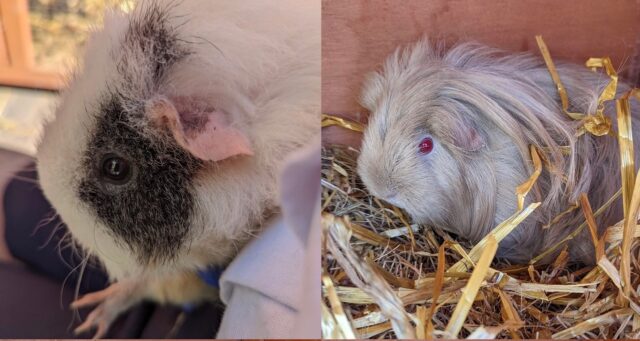This Guinea Pig Awareness Week, RSPCA reveals the cost of living crisis is believed to be to blame for the rise in animals coming into the charity.
The RSPCA has revealed the number of guinea pigs coming into its care between January and August has risen by 90 per cent in the last two years*.
The heartbreaking statistics are being released as part of Guinea Pig Awareness Week (26 – 30 September) to raise awareness of the suffering faced by hundreds of small furries.
In the first eight months of 2020 the charity’s front line officers took in 91 guinea pigs, this rose to 111 in 2021 but already this year 173 have come into RSPCA care – an increase of 90%.
The RSPCA’s recent research through the Animal Kindness Index found that the cost of living crisis is of huge concern to pet owners with 68% of pet owners concerned that the cost of pet care was increasing and 19% worried about how they’ll afford to feed their pets*.
It is feared the cost of living is contributing to the overall rise in animals being neglected and abandoned.
Already this year the RSPCA has had 445 incidents* reported to the charity from people worried about guinea pigs – more than half of these were concerns about neglect (241) and 50 were heartbreaking cases of them being abandoned.
These incidents equate to more than 50 incidents per month involving almost 350 guinea pigs.
As well as guinea pigs the RSPCA is seeing this problem replicated across the country with all species of animal – as part of the charity’s Cancel Out Cruelty campaign, the RSPCA has revealed it received more than 100 reports of pets being abandoned every single day throughout 2021.
Guinea pigs abandoned
🐹In August this year the RSPCA appealed for information about two guinea pigs who were abandoned inside a shoebox in West Yorkshire.
A local business worker noticed the red shoebox in woods and was surprised to find a guinea pig inside, before noticing a second among the grass and leaves outside the box. An RSPCA inspector took the guinea pigs to RSPCA Manchester & Salford branch, where the animal care team are treating them for lice. Nicknamed Brenda (long-haired guinea pig) and Myrtle (black and white) by the staff, they will now receive plenty of TLC, until they are ready to be rehomed.
🐹Lola, Willow and Ruby came into our care due to their owners moving to new accommodation and unfortunately being unable to take them with them. Lola, Willow and Ruby are very nervous but sweet girls looking for a home together. They are unsure when being handled and will run away and hide when you approach them. However, if you sit relatively still and quietly, Lola, Willow and Ruby will eventually come out of their hiding spots and may even take a treat from your hand. For this reason, these lovely girls will need time to settle into their new home but they have lots of potential to become wonderful additions to their new family.
Rehoming is also slowing down across the RSPCA as a result of the cost of living crisis – pre-pandemic in 2019 the charity rehomed 176 guinea pigs in 2020 this number dropped to 109, in 2021 120 were rehomed and so far this year just 95 have found new homes.
RSPCA companion animal expert Dr Jane Tyson said: “It’s heartbreaking to think of all the unwanted pets out there, we do sympathise with people struggling at the moment due to the cost of living but we would urge anyone worried about costs associated with their pets to reach out for help.
“Friends, family, local charities, and vet charities can all provide support but it is never the answer to just dump an animal or to let it fall into a state of neglect.
“Sadly many more than we have space for are waiting to come into our centres.
“Guinea pigs are misunderstood animals, they are often bought for children who can lose interest but they have very complex needs and a relatively long life span.
“They are social animals and need plenty of space to roam around in, they can make very rewarding pets but they are a responsibility and a commitment.”
Our frontline teams are working hard to rescue animals in need this summer but we can’t do it alone – we need your help to Cancel Out Cruelty. To help support the RSPCA, visit: www.rspca.org.uk/stopcruelty.
To help the RSPCA continue rescuing, rehabilitating and rehoming animals in desperate need of care please visit our website or call our donation line on 0300 123 8181.




